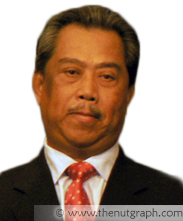(Malaysiakini) In the harshest rebukes yet of the New Economic Policy (NEP) yet, CIMB group CEO Nazir Abdul Razak described the NEP as having been bastardised by deviating from its original purpose.
 "I have strong opinions about how the NEP has been bastardised over the years," he said in a question-and-answer session after delivering a talk at the Chinese Economic Congress this afternoon.
"I have strong opinions about how the NEP has been bastardised over the years," he said in a question-and-answer session after delivering a talk at the Chinese Economic Congress this afternoon.
Saying that it has come a long way from the social engineering experiment originally aimed at eradicating poverty, Nazir (right) said that the NEP has appeared to enrich small pockets of people.
 "I have strong opinions about how the NEP has been bastardised over the years," he said in a question-and-answer session after delivering a talk at the Chinese Economic Congress this afternoon.
"I have strong opinions about how the NEP has been bastardised over the years," he said in a question-and-answer session after delivering a talk at the Chinese Economic Congress this afternoon.Saying that it has come a long way from the social engineering experiment originally aimed at eradicating poverty, Nazir (right) said that the NEP has appeared to enrich small pockets of people.
“At that time, no one knew what the outcome would be. It was a social engineering experiment that no one had ever done before in any country. So they gave it 20 years. And they felt that after 1969 they had to give it a try.
“But now it is so embedded in every thing that we do, in every part of the government, in every part of businesses that it become a problem.
“But now it is so embedded in every thing that we do, in every part of the government, in every part of businesses that it become a problem.
“And today, every time I mention the NEP, I get blasted,” Nazir said when fielding a question from the floor on his thoughts on the policy.
 "What I don't understand is giving these people Approved Permits (AP).That should go.
"What I don't understand is giving these people Approved Permits (AP).That should go.
 "What I don't understand is giving these people Approved Permits (AP).That should go.
"What I don't understand is giving these people Approved Permits (AP).That should go."If you just want a small number of people to make money, might as well just give them money," said Nazir, was reported to be the highest-paid GLC CEO back in 2007, drawing in an income of RM9.35 million then.
Incidentally, the main architect of the New Economic Policy when it was drawn up in 1971 was Nazir's own father, the country's second prime minister Abdul Razak Hussein.
'Time to review NEP'
Boldly departing from the normal comfort zone, the banker also said that the affirmative action needs a relook.
“Now we need to address what kind of affirmative action we want to have. It is so infused in everything. But we will one day need to confront it one way or another,” said Nazir, who is the younger brother of current PM Najib Razak.
Boldly departing from the normal comfort zone, the banker also said that the affirmative action needs a relook.
“Now we need to address what kind of affirmative action we want to have. It is so infused in everything. But we will one day need to confront it one way or another,” said Nazir, who is the younger brother of current PM Najib Razak.
The NEP officially came to an end in 1990, but its traditions and policies still continue to this day. Najib had announced a New Economic Model back in March to reform and rebuild the Malaysian economy.
However, details still remain to be made public.
However, details still remain to be made public.
'Ignore extremist groups'
Speaking after delivering his luncheon address titled “Strength in Diversity, Beyond the Rhetoric”, Nazir also told the mainly Chinese participants to look beyond party calls advocating the rights of their own race.
 Careful not to name names, he just advised the participants to “ignore them” when asked his stand on such groups.
Careful not to name names, he just advised the participants to “ignore them” when asked his stand on such groups.
“We have to accept that in a free and open society, we have to expect extremes. A few noisy people in the corner do not make up the majority or represent the majority.
“We as the majority have the strength to ignore them. Don't get too caught up with what others are saying, or what they are doing.
Speaking after delivering his luncheon address titled “Strength in Diversity, Beyond the Rhetoric”, Nazir also told the mainly Chinese participants to look beyond party calls advocating the rights of their own race.
 Careful not to name names, he just advised the participants to “ignore them” when asked his stand on such groups.
Careful not to name names, he just advised the participants to “ignore them” when asked his stand on such groups.“We have to accept that in a free and open society, we have to expect extremes. A few noisy people in the corner do not make up the majority or represent the majority.
“We as the majority have the strength to ignore them. Don't get too caught up with what others are saying, or what they are doing.
“Don't waste your time engaging with them,” he said.
Earlier, he also joked that he is a descendant of an immigrant family.
“I told (grand-daughter of one of the founding members of MCA Tan Cheng Lock) Tan Siok Choo that her family came to this country earlier than my family,” he said in between chuckles.
Earlier, he also joked that he is a descendant of an immigrant family.
“I told (grand-daughter of one of the founding members of MCA Tan Cheng Lock) Tan Siok Choo that her family came to this country earlier than my family,” he said in between chuckles.

 Party pro-tem secretary-general P Uthayakumar (left) said. "I dreamt of the magical number '1538' while I was in detention under ISA in the Kamunting Detention Camp in Taiping and we hope to realise this dream in the coming general election. This will give us the political power to voice out the concerns of the Indian community both in the state assemblies and in Parliament."
Party pro-tem secretary-general P Uthayakumar (left) said. "I dreamt of the magical number '1538' while I was in detention under ISA in the Kamunting Detention Camp in Taiping and we hope to realise this dream in the coming general election. This will give us the political power to voice out the concerns of the Indian community both in the state assemblies and in Parliament." Pakatan Indian politicians who were elected in constituencies with a large Indian presence failed to highlight the plight of the community both in the state assemblies and in Parliament he charged.
Pakatan Indian politicians who were elected in constituencies with a large Indian presence failed to highlight the plight of the community both in the state assemblies and in Parliament he charged. When asked about allegations that he was attacking Pakatan publicly with the aim of getting his party registered by the Registrar of Societies (ROS), an angry Uthyakumar said, "Our enemy is Umno-BN who had taken away our rights as citizens of this country."
When asked about allegations that he was attacking Pakatan publicly with the aim of getting his party registered by the Registrar of Societies (ROS), an angry Uthyakumar said, "Our enemy is Umno-BN who had taken away our rights as citizens of this country." Then it will go into constituencies with a large Indian presence and increase the Indian voter populations to ensure that they win their seats.
Then it will go into constituencies with a large Indian presence and increase the Indian voter populations to ensure that they win their seats.
 By S Rutra - Free Malaysia Today
By S Rutra - Free Malaysia Today According to Ragunath, the coucil should not function like a political party or human rights organisation, and as its president, he needed to strike a balance.
According to Ragunath, the coucil should not function like a political party or human rights organisation, and as its president, he needed to strike a balance. Meanwhile, Bar Council secretary George Varughese said he did not agree with Bon's hard-hitting views.
Meanwhile, Bar Council secretary George Varughese said he did not agree with Bon's hard-hitting views. By G Vinod - Free Malaysia Today
By G Vinod - Free Malaysia Today

 By Patrick Lee - Free Malaysia Today,
By Patrick Lee - Free Malaysia Today,
 She said college-trained relief teachers belonged to a special category known as the National Reserved Teachers Group. This group consists of both former and retired teachers. (Former teachers are those who left the teaching profession.)
She said college-trained relief teachers belonged to a special category known as the National Reserved Teachers Group. This group consists of both former and retired teachers. (Former teachers are those who left the teaching profession.)


 By Teoh El Sen
By Teoh El Sen
 Surendran said if the police were under the impression that the government would protect them, then such incidents would happen again.
Surendran said if the police were under the impression that the government would protect them, then such incidents would happen again.




 If centralised exams are replaced with school-based assessment, can teachers be trusted to set aside their personal, religious or racial bias when grading students?
If centralised exams are replaced with school-based assessment, can teachers be trusted to set aside their personal, religious or racial bias when grading students?
 I shall attempt to retell the narrative this press statement suggests, in a more chronological order. The two main parties involved are the police and the AG’s chambers (yeah, think “Law and Order”). I must note that this account is based only and entirely on the official press statement from the latter.
I shall attempt to retell the narrative this press statement suggests, in a more chronological order. The two main parties involved are the police and the AG’s chambers (yeah, think “Law and Order”). I must note that this account is based only and entirely on the official press statement from the latter. ASP Ahmad Nazri: “Err. Boss. You remember last year when I said I didn’t find that note on July 17?”
ASP Ahmad Nazri: “Err. Boss. You remember last year when I said I didn’t find that note on July 17?” More recently, even the highest judicial officer in the land, Chief Justice Tun Zaki Azmi, was appointed to his position in a considerably controversial manner.
More recently, even the highest judicial officer in the land, Chief Justice Tun Zaki Azmi, was appointed to his position in a considerably controversial manner.